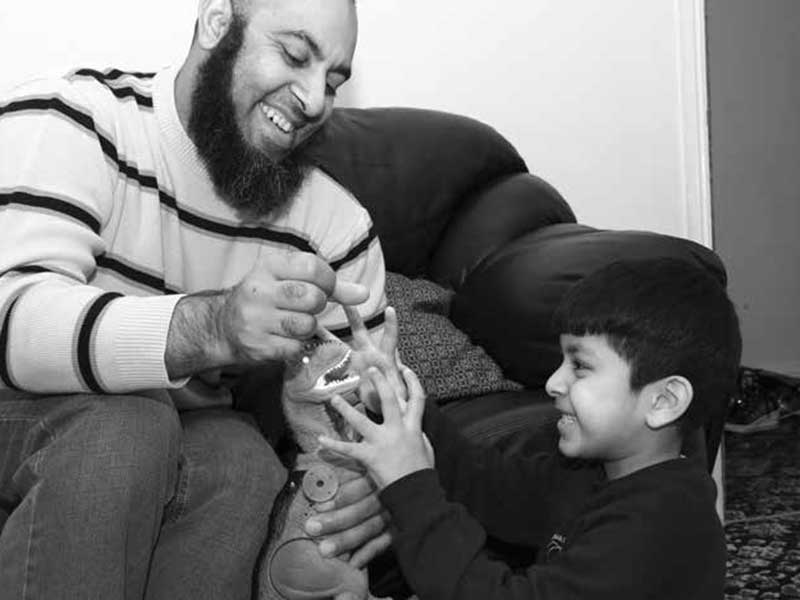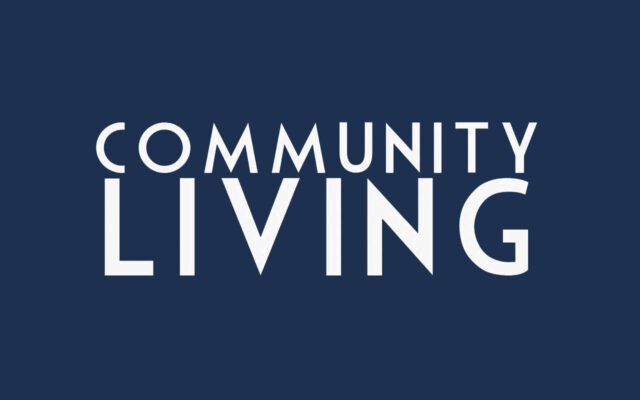
Dino time: research often ignores the fun, love and brilliance that characterises much of family life
I was thinking about this article a few months before an exemplary “What is wrong with research?” news story was splashed across national channels in August this year.
It concerned Spectrum 10K, a project to investigate “genetic and environmental factors that contribute to autism and related physical and mental health conditions to better understand wellbeing in autistic people and their families”.
The Wellcome Trust-funded project was paused in September by its lead, Simon Baron Cohen, after concerns were raised by autistic people, their families and allies.
These included fuzziness around what it was trying to achieve, and a lack of detail about the use and the storage and sharing of collected DNA samples.
There were also fears the project may incorporate eugenic thinking given the longstanding interests of investigators and the lack of involvement of autistic people in its design.
The Health Research Authority is looking into the issues raised and the project team have commissioned a stakeholder engagement company to conduct a retrospective co-design.
Varied ethical stringency
That such a project gained approval from ethics committees in England and Scotland highlights how subjective and variable committee responses can be.
As researchers, we are required to jump through stringent hoops to get the necessary signing off to begin our work.
This includes providing micro detail to satisfy committee members that requests of potential participants are appropriate, that we will act in a responsible and respectful manner, and that data will be anonymised and securely stored for a specified length of time with potential data sharing clearly stated.
Ethics committee members are, of course, people with their own assumptions, thoughts, experiences, biases and viewpoints.
Prestigious project partners – Spectrum 10k involves the universities of Cambridge and California and the Wellcome Sanger Institute – may lead to lighter consideration of applications.
While we cannot know if this was the case here, freedom of information requests reveal inconsistencies in the committee’s considerations (O’Dell, 2021).
Centred on deficit
A further problem with research is the use of poorly framed questions, aims and objectives, which arise from incomplete understandings of the research topic.
Learning disability and autism research, including the Spectrum 10k project, is replete with examples of this.
Despite the influence of a social model of disability, which sees the difficulties people experience as an outcomes of external factors such as physical obstacles, prejudices and assumptions, research is too often underpinned by a pathologising, medical model that emphasises deficit, burden and cure.
A review of studies about research priorities (Roche et al, 2021) found members of the autistic community want research that will make a difference in their everyday lives.
In practice, autism funding is focused on basic science with animal research accounting for 44% of the total UK autism research funding in 2016 (Autistica, 2017).
American philosopher Eva Kittay (1999: 169) wrote about how parents of disabled children and professionals had different types of knowledge:
“There are, on the one hand, the imposing (often impressive and sometimes worthless) professional knowledges that are being applied to your child. On the other hand, there is one’s deep and intimate knowledge of this child, a knowledge that is, however, curtailed by one’s limitations in training and expertise.”
Researchers, funders and ethics committees add to impressive and sometimes worthless knowledge.
I remember an intensely earnest and well-meaning postgraduate student sitting in our living room asking a set of deficit-laden questions about our son, Connor, 20-odd years ago.
Each question made me feel my skin was being carefully sliced with a scalpel and yet I answered them. I was on the medical model page – in part because of the deficit-laden research evidence base – and could not see beyond trying to squidge Connor into a mainstream space he would never (brilliantly) fit.
Research that takes a deficit-focused approach erases consideration of the joy, love, fun and brilliance that characterises much of family life. In turn, the research findings replicate and add to a bleak and partial evidence base.
When I was writing Love, Learning Disabilities and Pockets of Brilliance, I was struck by the deficit focus in research around siblings of autistic children. Google Scholar threw up pages of studies about the negative impact of having an autistic sister or brother.
Pavlopoulou et al (2019) took a more enlightened approach, arguing it was not helpful to focus on a binary of positive and negative outcomes in terms of siblings’ wellbeing.
We need to approach our research within different frameworks that allow engagement with the interests and joys children shared.
The Pavlopoulou study found siblings were resourceful, empathetic, tolerant and loving, and viewed their family tasks as “helping out” rather than negatively framing them as “caring responsibilities”.
This underlines how important it is that research design, framing and focus are not set up to reinforce stereotypes, preconceived ideas and deficit models.
A final layer to this brief exploration of the wrongness of research is exclusion, in the form of being excluded at the beginning, middle or end of studies. I will begin with a personal example.
When Connor was around four years old, he was enrolled in a university sleep study. This involved wearing a monitor to record his night-time sleep patterns for a week.
We were asked to repeat the week as the monitor showed a level of wakefulness that suggested the device was faulty. When the second week produced a similar pattern of wakefulness, Connor was excluded from the study because his data could skew the findings.
It is grimly fascinating to witness how apparently scientifically robust research can have its edges smoothed to avoid unruly findings.
On wider scale, a review of projects funded by the National Institute of Health Research (NIHR) was conducted to determine the inclusion of people with learning disabilities in its portfolio (Spaul et al, 2020).
It found that: 60.3% of the studies had “learning disability” as an exclusion criterion; none investigating pneumonia or sepsis included people with learning disabilities, even though they can be susceptible to these conditions; and only 1.4% specifically related to people with learning disabilities.
The authors suggested “a review of ethical barriers and a more active involvement of research funding organisations to scrutinise the justifications behind this exclusion might be warranted”.
This removes people’s right to participate in research and the enjoyment, pride or satisfaction this may generate
This review revealed so much that is wrong it demands further unpacking. Learning disability as a blank exclusion criterion in research – what does this mean?
- It feeds into the consistent homogenisation of people with learning disabilities, erasing the variety of skills, abilities and ways of communicating.
- Treating everyone as the same makes it easier to remove people who come under this heading from research
- It removes people’s right to participate in research and the enjoyment, pride or satisfaction that this may generate
- It erases any consideration of (fluctuating) mental capacity and discussion around consultee consent that could enable people to participate
- It weakens the evidence base as research findings are less robust.
The last point has profound consequences given the enduring health inequalities and the rates of premature mortality for people with learning disabilities and autism.
Doing things better
How do we do things better and refuse to be comfortably numb?
I am working on two NIHR-funded projects involving people with learning disabilities and family carers: Flourishing Lives; and Growing Older, Planning Ahead.
These projects are, through a combination of bumpy and evolving involvement, co-design and a strong and cheerful commitment by everyone involved, helping us to understand how to do research better.
A commitment to doing things differently has involved the research process itself affecting team members in diverse ways, not least in the development of confidence.
Some of the things we have learned during this work around how to do research better include:
- Working with funders and ethics committees so they know the importance of meaningful involvement of people in research whether as participants or partners. This may involve careful explanation of why we need to support people to take part rather than deny them the opportunity
- Acknowledge we have learned a lot from past experiences of trying to involve people in research and continue to improve our knowledge, skills and ways of engaging
- Recognise that research participation can be beneficial and enjoyable, and the potential for harm is low
- Be upfront and clear about the additional resources needed to pay people for their work and the time and flexibility required for effective engagement. This includes developing and sustaining relationships with third-sector organisations and people that continue after the project ends.
Kittay (1999: 178) wrote “those who plow the fields of social justice know an oppression that has laid so heavy on the shoulders of its victims that it has numbed the response to the burden is the most unjust of all.”
We all have a responsibility to act on these injustices. The effective and swift response to Spectrum 10k by the autistic community and allies is a refreshing example of a refusal to be comfortably numb.
Doing research better is essential to achieving effective and meaningful change and redressing longstanding inequalities throughout life. This is a conversation we as a research community need to continue and embrace, as uncomfortable as it can be.
Sara Ryan is a professor of social care at Manchester Metropolitan University and author of Justice for Laughing Boy: Connor Sparrowhawk – a Death by Indifference.
O’Dell L (2021) Spectrum 10K: health official slammed “messy” ethics application from controversial autism DNA study. https://tinyurl.com/567dmnhv
Roche L, Adams D, Clark M (2021) Research priorities of the autism community: a systematic review of key stakeholder perspectives. Autism. 25(2):336-348
Autistica (2017) A review of the autism research funding landscape in the United Kingdom. https://tinyurl.com/he8dtnhc
Kittay E (1999) Love’s Labour: Essays on Women, Equality and Dependency. New York (NY): Routledge: 169
Pavlopoulou G, Dimitriou D. “I don’t live with autism; I live with my sister”. Sisters’ accounts on growing up with their preverbal autistic siblings. Res Dev Disabil. 2019;88:1-15
Spaul S, Hudson R, Harvey C et al (2020) Exclusion criterion: learning disability. Letter. Lancet. https://tinyurl.com/3xcpkrcn




